For Punch List Work and Small Jobs, the DeWalt 20V Max Roofing Nailer is a Huge Timesaver
The DeWalt 20V Max roofing nailer is the first cordless roofing nailer we’ve been able to get our hands on that uses just a battery for its power source. No gas cartridges, no fumes, no hoses, no compressor. Being the first carries some risk, and we wanted to know how well DeWalt did as the forerunner.
Pros
- Bump fires with little delay
- Loading nails is simple and familiar if you’re used to pneumatic guns
- 3 fastener length settings on the magazine
- Depth adjustment is easy to manipulate
- Effective blade release lever
- Plenty of power to fully drive roofing nails with consistent depth
Cons
- Magazine cover is a bit flimsy and can pop open
- Motor needs a moment to spool up before you can start nailing
- Heavier and bulkier than pneumatic (common to cordless nailers)
Recommendation
The DeWalt 20V Max cordless roofing nailer is an excellent punch list, repair, and small job solution that saves you the time, effort, and hassle of running a compressor and hose. It’s not going to replace your pneumatic nailers for the bigger jobs and that’s not what DeWalt designed it to do.We like this one for roofing contractors and remodel/renovation contractors to quickly tackle small roofing jobs and move along with their day.
DeWalt 20V Max Cordless Roofing Nailer
The Project
I had a roofing project lined up and brought the DeWalt DCN45RN to see how well it could keep up against my pneumatic nailers. We were completely removing the old roofing materials and replacing it with all new waterproofing, flashing, and architectural shingles.
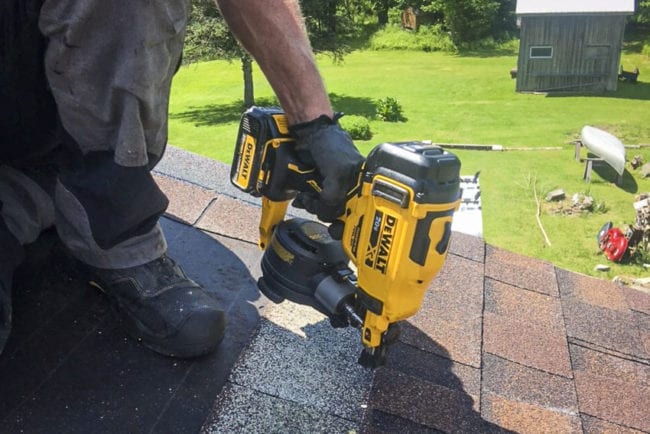
With a storm system heading in, time was of the essence. While our team worked on much of the roof with air guns, I used the DeWalt cordless roofing nailer around the double chimney, in the valley, where I started the tiered rows, and where I finished them off on the ends.
First Impressions
Right out of the gate, I was able to get started minutes ahead of the rest of the guys since I didn’t have a hose and compressor to set up. It also made climbing easier without the hose dragging behind.
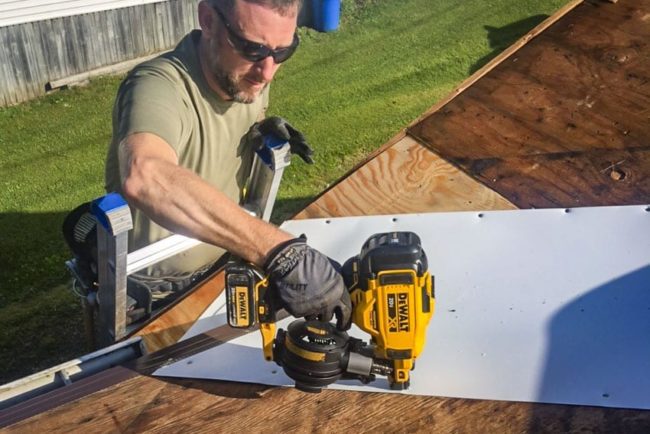
The nailer is clearly heavier and bulkier than the pneumatic models. It’s not a surprise, though. Having to pack the entire power source onto and into the tool requires that kind of trade-off.
Still, I could jump around and hit those smaller tasks and leave the production shingling to the rest of the guys. It wasn’t just the short-term thrill of owning a new tool. The quick start and freedom to move are things I’ve enjoyed on other jobs that followed, too.
No Trouble Adjusting
Getting into the job, I needed to set the right nail depth. The adjustment knob is on the top where it’s easy to access. There are 5 positions to click into and it’s easy to grip when you’re wearing gloves.
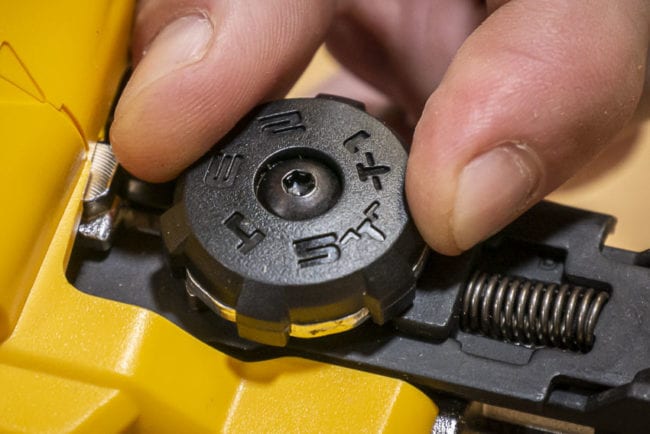
There are three magazine positions as well. To adjust it, rotate the tray out, push it to the level you want, and rotate it back in. Put your coil of up to 120 nails in and you’re ready to go.
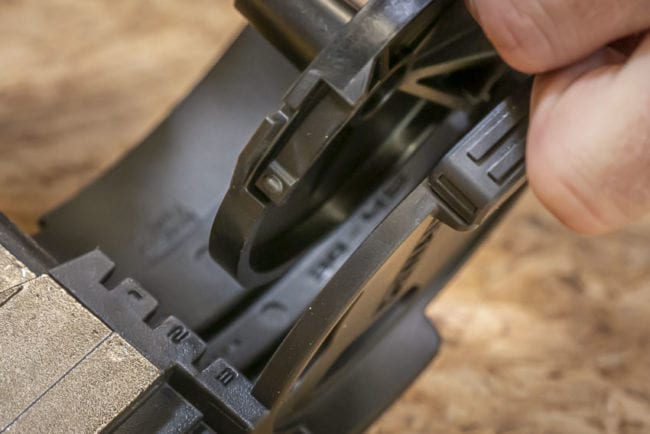
We were using 1 3/4-inch, 15º wire collated nails with 1 1/4-inch nails on a couple of other jobs. In both cases, making the nail size and depth adjustments were easy first steps.
Nailing Performance
Switching from a pneumatic roofing nailer, going cordless takes a little getting used to. You need to give the trigger a pull and let the motor spin up for a second or two before it’s ready to fire. Once it is, you can bump fire along at a consistent rate.
While we don’t see it as a problem, note that this nailer only has a bump fire mode.
You’re not going to see pneumatic speed here. You can fire roughly 3 nails per second. I found that to be plenty for the parts of the roof I was working on. Even in the production areas, it’s not too much of a slowdown.
With the two nail sizes we’ve been using in our DeWalt 20V Max cordless roofing nailer, we haven’t had any issues with the nailer driving to the depth we want and with consistent results.
Nail jams and misfires were few and far between. We’re not surprised or disappointed by the ones we had. We didn’t have any jams and the few misfires we had all seemed to be the result of the wire fouling rather than a failure to fire properly.
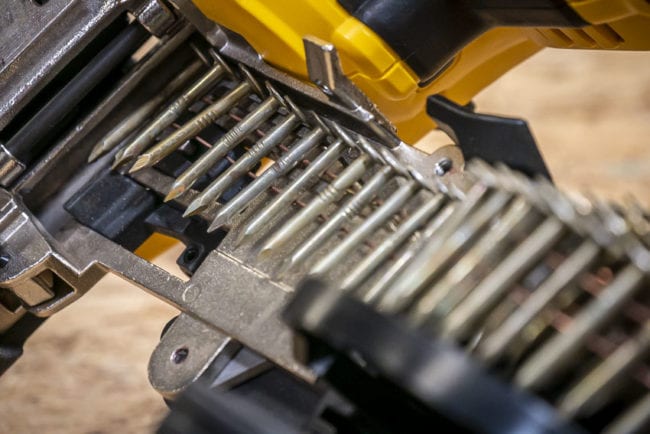
When you do get that jam or misfire, just flip the lever on top to pull the driver back.
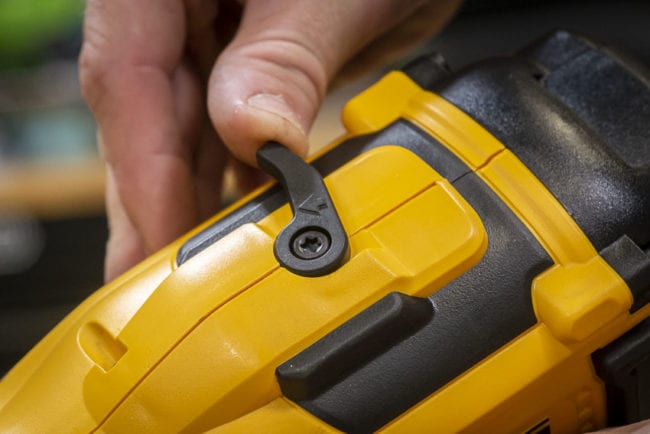
Runtime
With a 2.0Ah battery, you can expect to get about 500 shots—roughly a square worth of roofing (~100 square feet).
DeWalt kits their cordless roofing nailer with a 2.0Ah battery for good reason: it’s not a light tool. At 7.6 pounds with the battery, popping a FlexVolt 12.0 onboard to extend your runtime might sound like a good idea, but it’s going to be crazy-heavy.
Additional Field Notes
The one issue we had during our testing is that the magazine popped open a few times. The magazine and its catch are plastic and a little flimsy. It’s just enough for the magazine tab to slip out and open up. It doesn’t happen all the time, only when you set it down just right.
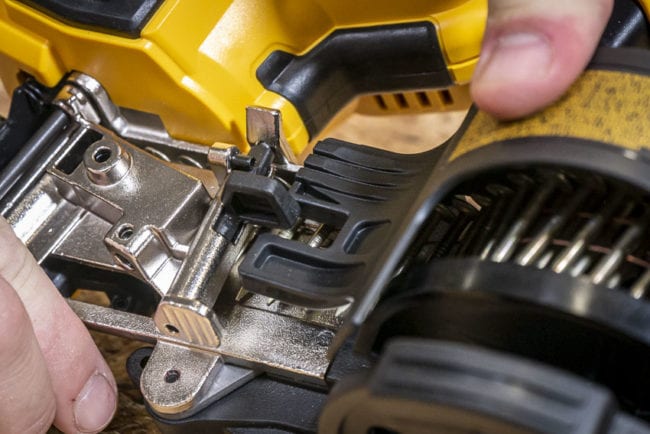
The tool is understandably top heavy. Like the trade-off you make in weight by going cordless, the balance shifts as well.
Price
You can get the DeWalt 20V Max cordless roofing nailer with a 2.0Ah battery and charger for $399 or $319 as a bare tool. It’s the only one of its kind currently, so it’s tough to argue with the price. Even so, it’s in line with what we expected.
The Bottom Line
The DeWalt 20V Max cordless roofing nailer is an excellent punch list, repair, and small job solution that saves you the time, effort, and hassle of running a compressor and hose. It’s not going to replace your pneumatic nailers for the bigger jobs and that’s not what DeWalt designed it to do.
W like this one for roofing contractors and remodel/renovation contractors to quickly tackle small roofing jobs and move along with their day.
DeWalt 20V Max Roofing Nailer Specifications
- Model: DeWalt DCN45RND1
- Canister Capacity: 120 nails
- Fastener Range: 3/4 in. – 1-3/4 in.
- Height: 11.5 in.
- Length: 11.5 in.
- Weight: 6.7 lbs. (7.6 pounds with battery)
- Warranty: 3 years
- Price: $399

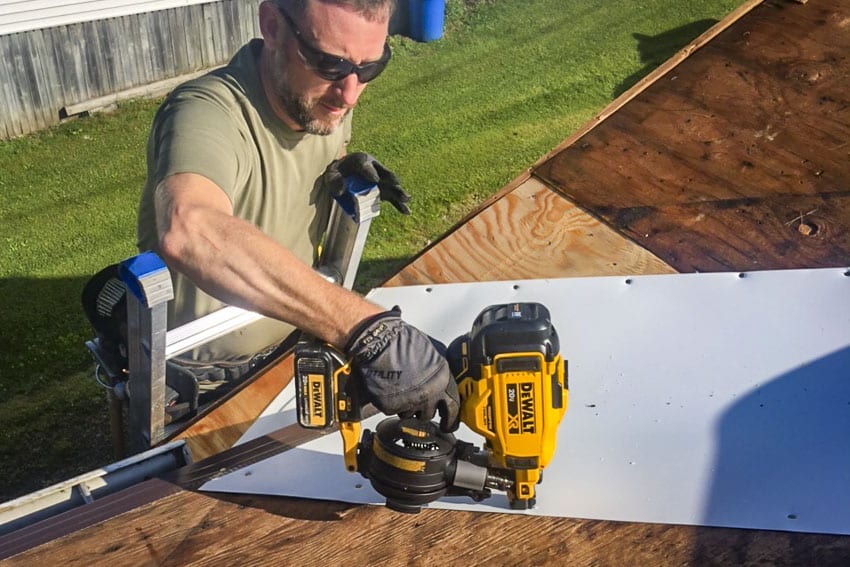
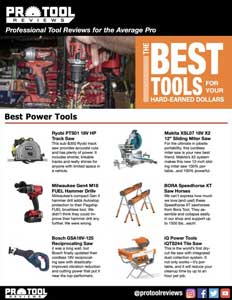

What type of cordless nailer do you recommend for doing fence work? We tend to go through a lot of wooden fences in north Texas due to windy storms. Thanks!
I already own the DeWalt cordless pin nailer for trims, etc and have been very satisfied for several years owning that tool. We do a lot of small type projects such as bathroom remodels, etc and the cordless saves a lot of time over trying to set up conventional compressor & hoses for installing a small amount of base or casing mouldings on our jobs.
So if this tool is like DeWalt’s already established trim nailer(s), we may purchase this for small roof/water leakage repairs we perform at times for our customers.
Well, tonight is the first night for Milwaukee to tease us,… showcase all of their new tools that are supposed to be released soon. We’ll see if they have anything to compete or compare with this. That being said, this looks like a good tool that should do what it is designed to do. However, we all know that this will be picked up by a lot of guys, who think it is supposed to be a full roof job tool, and use it in such a manner. Then half way through the job, they’ll see it is slower than… Read more »